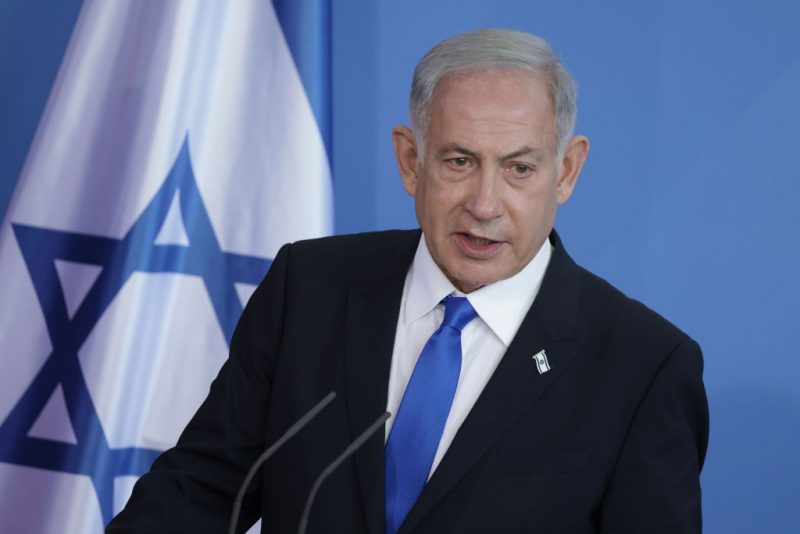

OAN Staff Brooke Mallory
12:15 PM – Monday, August 26, 2024
For the “limited nature of Sunday’s attacks on Hezbollah,” Benjamin Netanyahu is facing some political blowback in his country, as other Israeli officials call for a more extensive offensive in Lebanon.
Advertisement
The more right-wing faction of the prime minister’s own coalition, which is also growingly split over Jerusalem’s holiest site status, delivered some of the recent condemnation.
“Israel’s airstrikes and Hezbollah’s rocket and drone launches that followed soon after was the biggest cross-border engagement since the two sides fought a war in 2006 in terms of the number of aircraft sorties and munitions launched, though not in terms of casualties. Three Hezbollah and allied fighters were killed and one Israeli sailor, killed by fragments of an Israeli interceptor,” The Guardian outlet reported.
According to Israel’s Defense Minister Yoav Gallant, Hezbollah was unable to fire up to two thirds of the rockets it had planned to hit Israel with as a result of the preemptive strikes carried out early on Sunday.
Israel maintained that it had shot down nearly every Hezbollah drone that was approaching.
Although Netanyahu cautioned that the airstrikes would not be “the end of the story,” military sources were quoted in the Israeli press as claiming that no planned follow-up was in place.
The prime minister was blasted on Monday by critics on both the left and right for the limited success of Sunday’s air raids, which did, however, prevent Hezbollah from carrying out its intended aerial attack. However, the critics claimed that the prime minister had done nothing to facilitate the return of up to 80,000 residents of northern border towns who had been uprooted from northern Israel since October.
After being driven from their homes by Hezbollah bombings in support of Hamas in Gaza, displaced people’s leaders have declared they will not attend meetings with government officials, accusing the coalition of putting the defense of central Israel first but not the north.
“For nearly a year, the Galilee has been pulverized, ravaged and set on fire; tens of thousands of Israelis have been torn from their homes; and the entire country, which not long ago was considered to be a regional superpower, has been humiliated.” He said Netanyahu had chosen the most cautious of the military options presented to him by his generals,” said Ben Caspit, a columnist for the newspaper Maariv. “He prevented and disrupted one of Hezbollah’s operational plans, but he didn’t change our strategic situation in the northern theatre,” Caspit added, arguing that a broader aerial campaign would begin “to create the conditions to allow the residents of the Upper Galilee to return to their homes and to allow Israel to restore its sovereignty over swaths of its own territory.”
One of Netanyahu’s opponents and a retired general, Benny Gantz, referred to the bombings as “too little, too late.” Gantz was a former minister in Netanyahu’s coalition.
“We must keep up the advantage of the initiative that was taken and increase the political and military pressure to push Hezbollah away, to return northern residents to their homes safely,” Gantz said.
Itamar Ben-Gvir, Netanyahu’s national security minister, echoed the criticism.
“Israel must not be content with a single, pre-emptive sortie. We must bring a decisive war against Hezbollah that will remove the threat in the north and allow the residents to return home safely,” Ben-Gvir said.
He specifically accused Gallant of being responsible. The national security and defense ministers are embroiled in a fierce public spat over government policies, namely on the status of Jerusalem’s sacred area surrounding the Dome of the Rock and Al-Aqsa mosque, which Jews refer to as the Temple Mount.
Ben-Gvir persisted in his effort to reverse Israel’s policy, which had been in place since it annexed East Jerusalem in 1967 and stipulated that Jews were to pray at the Western Wall and only Muslims were permitted to pray on the complex.
When Ben-Gvir led Jewish prayers there last month and declared on army radio on Monday that Jews and Muslims were on equal footing, he violated that policy.
“The policies on the Temple Mount allow prayer, period,” he said. “There is a directive that there should be equal law between Jews and Muslims.”
He went on to say that if it were up to him, Temple Mount would have both an Israeli flag and a synagogue.
In response, the prime minister’s office said that nothing had changed in regards to the status quo of the location. Meanwhile, other coalition members chastised Ben-Gvir for his “provocative remarks,” claiming that he could likely incite a Palestinian uprising and stir up fury throughout the Arab world.
“Undermining the status quo on the Temple Mount is an unnecessary and irresponsible act,” Gallant said. “Ben-Gvir’s actions endanger Israel.”
Stay informed! Receive breaking news blasts directly to your inbox for free. Subscribe here. https://www.oann.com/alerts
Advertisements below

